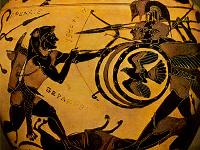|
|
M.Ed. Curriculum & Instruction
Specialization: English Language Arts, 5-12 Licensure
Graduation: August 2015, University of Minnesota, Twin Cities
GPA: 4.00
Coursework Specializations:
| Course | Description |
|---|
| Popular Culture, Teaching, and Learning | Approaches to the study of popular culture and education. Intersection between everyday life and broader historical contexts. Sporting events, toys, clothing, shopping malls, vampire mania, music festivals, video, and comics are the kinds of popular forms of culture we will engage as we develop teaching/learning strategies. |
| New Literacies Frameworks and Instruction: Digital Texts and Digital Reading | Read digital texts against backdrop of traditional print-based notions of reading, literacy, school curricula/instruction. Assists education professionals in making school/district-wide decisions based on sound research on digital reading/new literacies. |
| Teaching Film, Television, and Media Studies | "Critical" media literacy means that we focus on, among other things, analyzing the intersection between media and issues of identity -- like gender, race, class and sexuality. We also focus on how to teach critical media analysis to students and others. |
| Technology for Teaching and Learning | Diverse educational technology in K-12 classrooms. Effective use of technology. Computer technologies used to stimulate personal productivity/communication and to enhance teaching/learning processes. |
Descriptions taken from U of M Graduate Course Descriptions
M.A. English
Specialization: Rhetoric, Composition, and Professional Communication
Thesis: Using student concerns to improve writing assignment sheets Abstract
Graduation: May 2001, Iowa State University
GPA: 3.67
Coursework Specializations:
| Course | Description |
|---|
| Proseminar: Teaching English Composition | Introduction to the teaching of First-Year Composition.Current theories and practices related to First-Year Composition objectives, lesson planning and teaching methods, development of writing assignments, evaluation of student writing. |
| Teaching Composition: Theory and Research | Consideration of current pedagogic theories and research in composition/rhetoric. |
| Teaching Business and Technical Writing | Theory and practice of teaching college courses in business and technical writing. Some consideration of in-service writing courses for business and government. Emphasis on applicable communication and composition theory, curriculum planning, assignment design, materials development. |
| Visual Communication in Professional Writing | Rhetorical theory and research in graphics, document design, and related principles of visual communication. Methods of designing texts, data displays, illustrations, and other visual elements in business and technical communication. |
| Advanced Editing | Selected topics in editing academic, business, and technical documents; e.g., online documentation; computer pedagogy; hypertext; technical and scientific graphics. |
Thesis Abstract
Using student concerns to improve writing assignment sheets
Within the field of writing composition, current literature and research for developing clear and effective writing assignment sheets inadequately address students' concerns. Understanding students' concerns could allow instructors to generate assignments that challenge students while sparking their interest and stimulating their intellectual development.
High levels of detail in writing assignments limit students' investment in a writing assignment. Students feel that highly structured tasks are a matter of being able to closely follow the directions of a writing assignment sheet, simply a check to see if they read the material or pay attention in class. There is no opportunity for exploration of a topic of interest nor a presentation of their argument in their own voice when instructors restrict writing tasks by overly dictating genre, style, expression, topic, length, etc.
Instructors should challenge students to think critically when approaching a writing task. If instructors provide students with too much information about the writing task, there is little opportunity for them to develop higher-level critical thinking. We need to develop writing assignment sheets that present students with a writing task of a particular type (summary, analysis, synthesis, argument, etc.), outlining particular skills the students need to demonstrate or develop in their papers, but omit specific details (topic, stance, style, voice, etc.) in order to force students to make important developmental decisions about their own writings.
Most importantly, we must actually teach students this philosophy of writing assignments so they understand why assignments are constructed in this manner. Students must be taught to view writing assignment sheets not as a contract for a grade, but as a guide to knowledge and critical thinking. Not only will this make the writing assignment interesting for the student, but instructors will receive papers that accomplish the goals of summary, analysis, argument, etc. but yet are diverse, challenging, creative, and interesting to read.
B.A. English
Specialization: Rhetoric and Professional Communication
Minors: Classical Studies, Computer Science, Speech Communications
Graduation: May 1998, Iowa State University
GPA: 3.13
Coursework Specializations:
| Course | Description |
|---|
| Rhetorical Analysis | Fundamental principles of rhetorical criticism. Focus on selected theories for analyzing cultural texts, including essays, speeches, film, technical and scientific documents, and web sites. Emphasis on identifying artifacts, formulating research questions, and designing methodology. |
| Business and Technical Editing | Editing journal articles, research reports, technical manuals, newsletters, and proposals. Attention to editorial levels and styles, project management, editor-author relationships, and electronic editing. |
| Visual Aspects of Business and Technical Communication | Rhetoric of visual elements in business and technical communication. Issues in the design of text, charts, graphs, diagrams, schematics, illustrations, and other visual displays. |
| Internship in Business, Technical, and Professional Communication | An opportunity to write, edit, and design business and technical documents in a professional setting. Projects include reports, proposals, manuals, brochures, newsletters. (For this course, I developed a website for Mary Greeley Medical Center, a local hospital.) |
Classical Studies
 I pursued a Classical Studies minor as a personal interest. Greek Mythology has always interested me because of the various stories created to explain natural phenomena. On an even more basic level, I simply enjoy the excitement and adventure in many of the individual myths. Greek Philosophy also interests me, not necessarily because I prescribe to the various theories of existence posed by Socrates, Plato, and Aristotle, but simply because I appreciate their challenge that people constantly re-evaluate their own beliefs systems in order that they understand why they believe what they believe. I pursued a Classical Studies minor as a personal interest. Greek Mythology has always interested me because of the various stories created to explain natural phenomena. On an even more basic level, I simply enjoy the excitement and adventure in many of the individual myths. Greek Philosophy also interests me, not necessarily because I prescribe to the various theories of existence posed by Socrates, Plato, and Aristotle, but simply because I appreciate their challenge that people constantly re-evaluate their own beliefs systems in order that they understand why they believe what they believe.
Computer Science
Since I was ten years old, I've been programming computers. Beginning with modifications to programs on the Astrocade Bally Arcade and the Commodore 64, I taught myself to read existing code, understanding the programs provided from various computer-programming books, and incorporate my own improvements to these programs. For example, I took a black-and-white, maze-navigating, treasure-hunting game and not only added color, but added varying types and values of treasure, as well as opponents who chase the player throughout the maze.
More recently, I've turned my interest in computers to web programming and design; I've designed a number of professional sites, including websites where I post all of my course materials for the classes I teach at Iowa State University. In addition to the C++ programming experience I gained in my Computer Science courses (such as software development, file organization and structures, and database creation), I feel this minor offers me accreditation in a hobby I enjoy.
Speech Communications
 Because public speaking is an ability that benefits most any career, I decided to confront my fear of speaking in front of audiences and earn a minor in Speech Communications. The courses I chose for this minor focused on professional speaking and audience analysis; most interesting to me were the analysis courses, as the concept of analyzing an audience applies to any kind of communication, especially when persuasion is involved. Audience analysis has helped me to better teach my classes at Iowa State, allowing me to understand my students' interests and abilities and adapt my courses to accommodate their learning styles. Because public speaking is an ability that benefits most any career, I decided to confront my fear of speaking in front of audiences and earn a minor in Speech Communications. The courses I chose for this minor focused on professional speaking and audience analysis; most interesting to me were the analysis courses, as the concept of analyzing an audience applies to any kind of communication, especially when persuasion is involved. Audience analysis has helped me to better teach my classes at Iowa State, allowing me to understand my students' interests and abilities and adapt my courses to accommodate their learning styles.
Course descriptions taken from Iowa State University Colleges and Curricula.
|